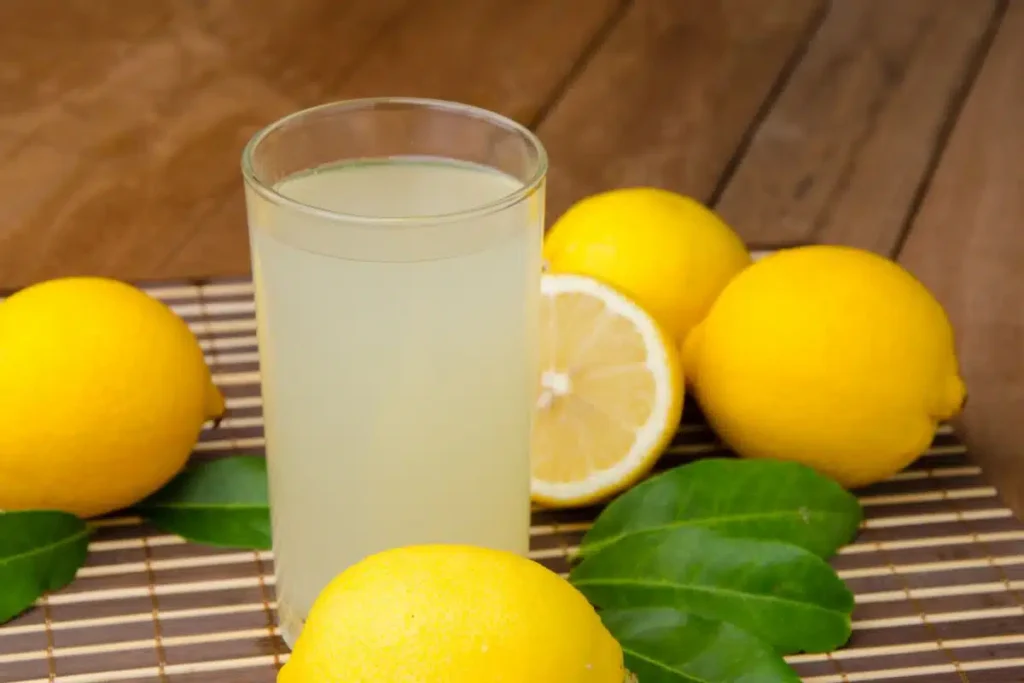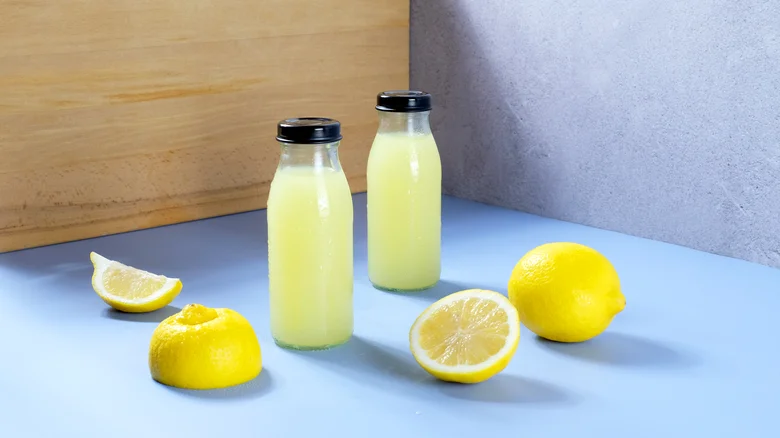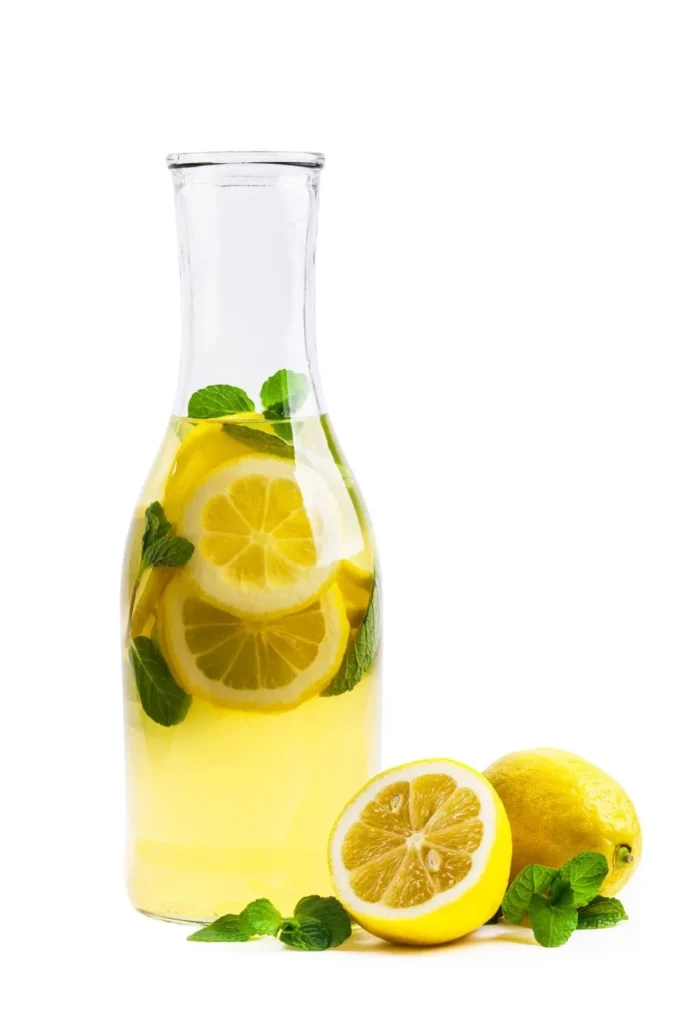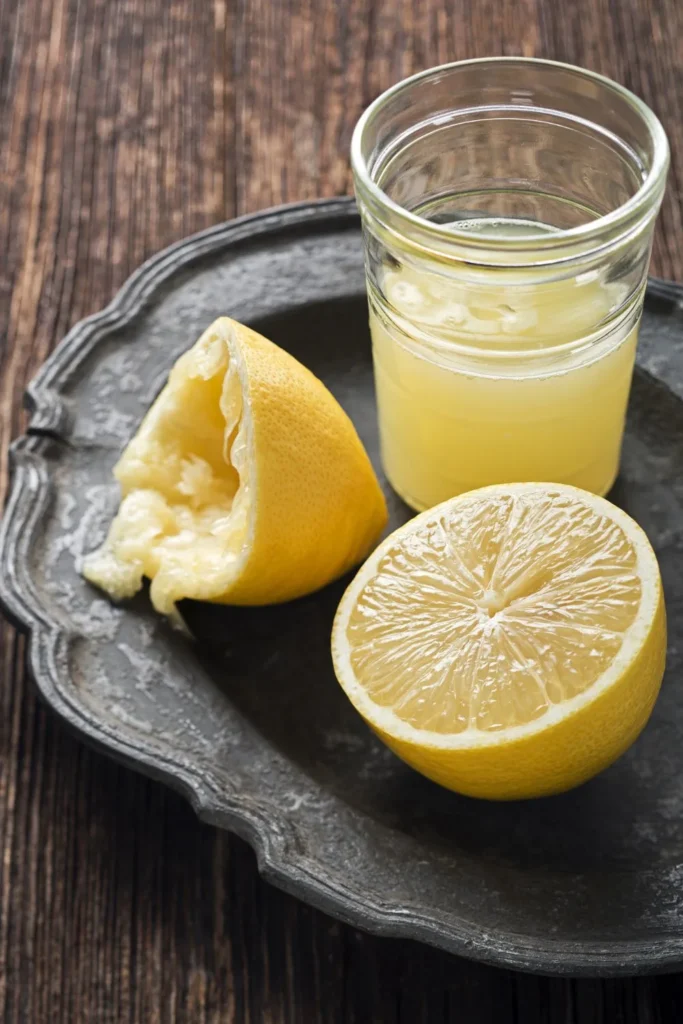As a food enthusiast, I have always been intrigued by the various ways in which food items can spoil or lose their freshness. One such item that has caught my attention is lemon juice. The question “does lemon juice go bad?” has been lingering in my mind for quite some time, so I decided to delve into the topic and find out the answer.
Lemon juice, a popular ingredient in various recipes and beverages, is known for its acidic nature and numerous health benefits. However, like any other food item, it can go bad over time. Fresh lemon juice can last up to 4 days in the refrigerator while commercial lemon juice can last up to 12 months. But, the question is: what factors cause lemon juice to spoil, and how can we determine if it has gone bad?
To answer these questions, I will explore the factors that can cause lemon juice to spoil, the signs that indicate it has gone bad, and the recommended methods for storing and preserving lemon juice to maintain its freshness and quality.
Shelf Life Of Lemon Juice
As someone who enjoys using fresh lemon juice in various recipes, I have come to understand that to know if the lemon juice goes bad, it is essential to understand its shelf life. Lemon juice, like any other food product, has a specific shelf life during which it remains safe and suitable for consumption. The shelf life of lemon juice can be influenced by several factors, including storage conditions, presence of preservatives, and packaging.
The shelf life of lemon juice can be categorized into two main types: refrigerated and unrefrigerated. Unrefrigerated lemon juice, such as the one you purchase at a grocery store, typically has a shelf life of about 6 to 12 months. This is due to the fact that the manufacturing process often involves pasteurization, which helps to extend the shelf life by killing harmful bacteria and other microorganisms. However, once opened, the unrefrigerated lemon juice should be consumed within 3 to 4 months for optimal freshness and flavor.
On the other hand, refrigerated lemon juice, which is usually found in the refrigerated section of a grocery store or in the produce department, has a much longer shelf life. When stored properly in the refrigerator, lemon juice can last for up to 6 months or even longer. Once opened, it should be consumed within 2 to 3 months for the best taste and quality.
| Storage Method | Refrigerated Shelf Life | Unrefrigerated Shelf Life |
| Fresh Lemons | 2-4 weeks | 1 week |
| Bottled Lemon Juice (Unopened) | 1 year | Indefinitely |
| Bottled Lemon Juice (Opened) | 3-6 months | Indefinitely |
Factors Affecting The Shelf Life Of Lemon Juice

Know that the shelf life of lemon juice is determined by various factors such as storage conditions, temperature, packaging, and the presence of preservatives. These factors can have a significant impact on the quality and safety of the lemon juice. Here, I will discuss some of the key factors affecting the shelf life of lemon juice.
Storage conditions
The storage conditions play a crucial role in determining the shelf life of lemon juice. Proper storage can help maintain the quality and freshness of the juice for a longer period. Lemon juice should be stored in a cool, dark place away from direct sunlight and heat sources. Exposure to light and heat can cause the lemon juice to spoil faster, leading to a shorter shelf life.
Temperature
Temperature is another significant factor affecting the shelf life of lemon juice. Storing lemon juice at room temperature (around 20-25°C or 68-77°F) can lead to bacterial growth and spoilage, reducing its shelf life. To extend the shelf life, it is advisable to store lemon juice in the refrigerator at a temperature of 4°C or 39.2°F. This will slow down the growth of bacteria and preserve the quality of the juice for a longer period.
Packaging
The packaging of lemon juice can also impact its shelf life. Lemon juice that is packaged in airtight containers, such as glass bottles or sealed plastic containers, can help maintain its quality and prevent spoilage. Make sure to check the packaging for any signs of damage or leakage, as this can compromise the shelf life of the lemon juice.
Preservatives
The presence of preservatives in lemon juice can also have a significant impact on its shelf life. Many commercial lemon juice products contain preservatives, such as sodium benzoate or potassium sorbate, which help prevent the growth of bacteria and mold. These preservatives can extend the shelf life of lemon juice, but they may not be suitable for everyone, especially those with allergies or sensitivities to certain chemicals.
Signs That Lemon Juice Has Gone Bad
As a person who loves using lemon juice in various recipes and drinks, I have encountered situations where I had to determine if the lemon juice has gone bad. Here are some signs that can help you figure out if the lemon juice has spoiled:

Off smell
One of the first signs of spoiled lemon juice is a distinct, unpleasant odor. Fresh lemon juice has a clean, zesty aroma, while spoiled juice will have a sour, musty, or off-putting smell. If the smell of the lemon juice is not inviting or makes you question its freshness, it’s likely gone bad.
Changes in color
Fresh lemon juice is usually clear or slightly cloudy with a yellow hue. However, if you notice that the lemon juice has turned brown or has a cloudy appearance, it could be a sign of spoilage. The browning may be due to oxidation, which can cause the juice to lose its freshness and flavor.
Separation of sediments
Lemon juice may naturally separate into layers over time, with a thicker, more concentrated liquid on the bottom and a clearer liquid on top. If you notice this separation, give the juice a gentle stir to mix it back together. If it doesn’t mix well and appears to have solidified or curdled, the lemon juice may have spoiled.
Taste
A significant change in taste can also be a sign of spoiled lemon juice. Fresh lemon juice has a sharp, tangy flavor that adds a brightness to your dishes. If the lemon juice tastes dull, flat, or has an off-putting taste, it is likely spoiled.
Mold or sediment
If you see any mold or sediment in the lemon juice, it is a clear indication that the juice has gone bad. Mold and sediment can pose health risks, so it is essential to discard the lemon juice and clean the container thoroughly.
Storage Methods To Prolong Shelf Life
Now that you have an idea about the factors that affect the shelf life of lemon juice, let me share some storage methods that can help prolong its freshness and quality.

Refrigeration
One of the most effective ways to extend the shelf life of lemon juice is by storing it in the refrigerator. The cool temperature helps slow down the growth of bacteria and slows down the oxidation process, which can cause the juice to spoil. Make sure to keep the lemon juice in a tightly sealed container or bottle to prevent any contamination.
Freezing
If you have a large quantity of lemon juice that you want to preserve for an extended period, freezing is an excellent option. Freezing not only prolongs the shelf life but also retains the flavor and nutritional value of the juice. Pour the lemon juice into ice cube trays or freezer-safe containers, leaving some headspace for expansion. Once frozen, transfer the cubes or containers to a freezer bag for easier storage. Remember to label them with dates for reference.
Canning
Canning is another method to preserve lemon juice for a long time. It involves heating the juice to kill any bacteria or enzymes, then sealing it in sterilized jars. This process requires specific equipment and knowledge of proper canning techniques to ensure safety and prevent spoilage. It is recommended to follow a tested recipe or consult reliable sources for detailed instructions on how to can lemon juice properly.
Bottling with Citric Acid
Adding citric acid, which is naturally present in lemons, can help increase the acidity level of lemon juice and act as a preservative. To bottle lemon juice with citric acid, squeeze fresh lemons and strain the juice to remove any pulp or seeds. Add 1/4 teaspoon of citric acid per cup of lemon juice and stir well. Transfer the mixture into sterilized bottles or jars and seal them tightly. This method can help inhibit bacterial growth and extend the shelf life of the juice.

Using Preservatives
Commercially available preservatives, such as ascorbic acid (vitamin C) or sodium benzoate, can be added to lemon juice to prolong its shelf life. These preservatives help prevent microbial growth and delay spoilage. It is important to carefully follow the instructions and recommended dosage provided by the manufacturer when using these additives.
3 Methods To Preserve Lemon Juice
Other than the storage methods, here are three methods that I have personally used to preserve lemon juice:
Freezing
Freezing lemon juice is a convenient way to preserve its freshness and flavor for an extended period. To do this, start by juicing the lemons and straining the juice to remove any seeds or pulp. Then, pour the juice into ice cube trays, filling each compartment about three-quarters full. Place the trays in the freezer until the juice cubes are completely frozen. Once frozen, transfer the cubes into a resealable freezer bag or airtight container for long-term storage. When you need lemon juice, simply thaw as many cubes as needed.
Canning
Canning lemon juice is another effective method to preserve it for a longer shelf life. Begin by sterilizing canning jars and lids in boiling water or a dishwasher. Meanwhile, extract the lemon juice and strain it to remove any impurities. Heat the juice in a saucepan until it reaches a simmer but avoid boiling it. Next, carefully pour the hot lemon juice into the sterilized jars, leaving about half an inch of headspace at the top. Wipe the rims of the jars clean, place the lids on top, and tighten the bands. Process the jars in a boiling water bath for about 15 minutes. Afterward, remove them from the water bath and let them cool completely before storing them in a cool, dark place.
Dehydrating
Dehydrating lemon juice is an excellent method if you prefer powdered lemon zest or need lemon flavoring for various recipes. Start by juicing the lemons and straining the juice to remove any solids. Pour the strained juice onto dehydrator trays lined with non-stick sheets or parchment paper, ensuring that it spreads evenly in thin layers. Set your dehydrator to a low temperature (around 135°F or 57°C) and allow the juice to dehydrate for several hours until it becomes dry and brittle. Once fully dehydrated, remove the lemon juice from the trays and grind it into a fine powder using a blender or spice grinder. Store the powdered lemon juice in an airtight container in a cool, dark place.

Recommendations For Using Lemon Juice Past Its Prime
Lastly, I have had personal experience with using lemon juice that has passed its prime, and I have found a few recommendations that can help you make the most out of it. Here are five suggestions:
Use it for cleaning purposes
When lemon juice is no longer suitable for consumption, it can still be put to good use as a natural cleaner. Lemon juice has natural antibacterial properties and can be effective in removing stains and odors. You can use it to clean cutting boards, countertops, or even as a natural fabric freshener.
Create a DIY beauty treatment
Lemon juice can be used in various beauty treatments due to its natural acidity and vitamin C content. You can mix it with other ingredients like honey or yogurt to create face masks, hair treatments, or exfoliating scrubs. These homemade remedies can help rejuvenate your skin and hair.
Preserve fruits and vegetables
Lemon juice’s acidic nature makes it an excellent natural preservative. If you have fruits or vegetables that are starting to show signs of spoilage, you can squeeze some lemon juice over them to slow down the process. This technique works particularly well for fruits like apples, avocados, or bananas.
Make infused water or flavored beverages
Even if lemon juice is past its prime for direct consumption, it can still add flavor to your drinks. Squeeze some lemon juice into a pitcher of water and add slices of fresh fruit or herbs to create infused water with a refreshing twist. You can also mix it with sparkling water or use it as an ingredient in cocktails.
Utilize it in cooking and baking
While lemon juice may not be ideal for drinking or using as a garnish when past its prime, it can still be used in cooking and baking recipes that require acidity or a touch of citrus flavor. It can enhance the taste of marinades, salad dressings, sauces, or desserts like lemon bars or lemon-infused cakes.
Conclusion
In conclusion, lemon juice does go bad over time due to various factors such as exposure to air, light, and temperature. Freshly squeezed lemon juice can last for about 2-4 days when stored in the refrigerator, while commercially bottled lemon juice can last for several months to a year. Signs of spoilage include changes in color, odor, and taste. It is important to store lemon juice properly and check for any signs of deterioration before consuming it.
Additionally, freezing lemon juice can help extend its shelf life. However, it may affect the taste and texture of the juice once thawed. To ensure the freshness and quality of lemon juice, it is recommended to use it within a reasonable time frame.
FAQs
How Do You Know If Lemon Juice Is Bad?
Lemon juice that is bad might have a moldy appearance, a sour or off odor, and a cloudy or strange color.
Is It Ok To Use Expired Lemon Juice?
It’s not recommended to use expired lemon juice due to potential changes in taste, quality, and safety.
Does Unrefrigerated Lemon Juice Go Bad?
Unrefrigerated lemon juice can spoil after a few hours or days, especially if exposed to warmth or contaminants.
Is Bottled Lemon Juice Bad?
If bottled lemon juice has an unusual smell, taste, or appearance, it may have gone bad.
Will Expired Lemon Juice Make You Sick?
Consuming expired lemon juice can lead to digestive discomfort or other health issues due to spoilage.
How Long Does Lemon Juice Last At Room Temperature?
At room temperature, lemon juice typically remains fresh for 2-3 days but should be refrigerated for longer storage.
What Does Expired Lemon Juice Look Like?
Expired lemon juice might look discolored, cloudy, or have visible mold growth.
Does Lemon Juice Go Bad After Expiration Date?
While the expiration date provides a general guideline, check for signs of spoilage like odor or appearance changes.
Does Lemon Juice Go Bad After Opening?
Lemon juice quality may decline after opening, so it’s advisable to refrigerate and use it within a reasonable time frame.
Does Lemon Juice Go Bad If Left Out Overnight?
Leaving lemon juice out overnight can promote bacterial growth and spoilage, making it unsafe to consume.
Authoritative Reference
Food Poisoning. (n.d.).
Shimizu C, et al. (2019). Effects of lifelong intake of lemon polyphenols on aging and intestinal microbiome in the senescence-accelerated mouse prone 1 (SAMP1).
Uçan F, et al. (2016) Bioactive compounds and quality parameters of natural cloudy lemon juices.






